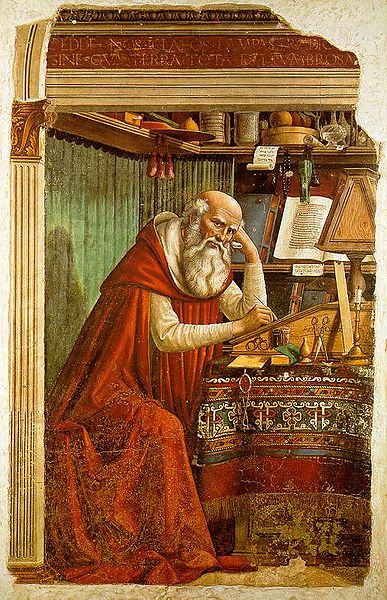
- •Глава 1topic 1: principles of translation
- •1.1. Notes on the Profession of the Translator
- •1.2. Professional pride
- •1.3. Income
- •1.4. Speed
- •1.5. Enjoyment
- •Basic interpretation and linguistic terms used in the Topic
- •Глава 2topic 2: theory of interpretation
- •2.1. Background of interpretation theory (it)
- •2.2. First translation of the Bible as a milestone in the history of interpretation and the development of world civilization. A bit of later history of interpretation
- •St. Jerome’s Oath
- •2.3. Deciphering the inscriptions on the Rosetta stone
- •2.4. A brief history of interpretation in the 20th Century
- •Глава 3topic 3: interpretation and contemporary life
- •3.1. XX century as a “golden age” of interpretation
- •3.2. Conference interpreting, professional training and diplomatic interpretation in XX century
- •3.3. Stagnation in economy – boom of interpretation
- •3.4. Interpretation in the New Millennium
- •3.5. The Very Beginning of Simultaneous Interpretation
- •Глава 4 Глава 5topic 4: interpretation activity
- •4.1. Translation and Interpretation Modes
- •4.2. Specific Skills required for interpreting
- •4.3. Simultaneous translation as a special kind of translating
- •4.4. Professional ethics and moral code of interpreters
- •Basic interpretation and linguistic terms used in previous topics
- •Big agribusiness draws cash
- •Глава 6topic 5: perception and understanding Глава 7of messages in interpreting
- •5.1. Sense Perception and Understanding
- •5.2. The “Inner Speech” of the Interpreter
- •5.3. Interpreting without “Understanding” the Sense
- •Basic interpretation and linguistic terms used in the topic
- •Kozak boat discovered in Dnipro River
- •Глава 8topic 6: types of contexts and contextual relationships in oral discourse
- •6.1. Text, Context and Discourse
- •6.2. Types of Contexts and Contextual Relationships
- •6.3. Recommendations for interpreters
- •Basic interpretation and linguistic terms used in topic 6
- •A Diet of Worms and Butterflies
- •Глава 9topic 7: semantic aspects of interpretation
- •7.1. Semantic Structure of the Oral Message and its Main Components
- •7.2. The Role of the Rhematic Components
- •In Comprehending and Interpreting Oral Messages
- •7.3. Rendering “evaluative component” of messages in interpreting
- •Basic interpretation and linguistic terms used in topic 7
- •Глава 10topic 8: semantic redundancy of oral messages. Interpreter's note–taking
- •8.1. Semantic Redundancy as one of the Main Properties of Oral Discourse
- •8.2. Ways of Ensuring Semantic Redundancy of Oral Messages
- •8.3. Semantic Redundancy: Recommendations for Interpreters
- •8.4. Interpreter's Note–taking
- •Basic interpetation and linguistic terms used in topic 8
- •How the Zero was Discovered
- •Legacy of death, bad health lingers from Chornobyl blast
2.2. First translation of the Bible as a milestone in the history of interpretation and the development of world civilization. A bit of later history of interpretation
Saint Geronimo was born in Dalmacia (Bosnia and Herzegovina) into a rich Christian family. It is known that he was born on September 30, which is now marked as the Day of translators. He got education in Rome, intensively studied ancient and Christian literature. In 375-378 AD he was living the life of a hermit in a desolate wilderness near Antioch (now Antalia).
He returned to Rome, was the Pope Damasy’s councilor. Perhaps Geronimo could become Pope’s successor, but he was not elected and left Rome, in 386 he settled in Bethlehem as a hermit.
He learned Aramaic and Hebrew languages, founded several monasteries, was the superior of the monastery in Beit-Lakhma near Jerusalem, where he died.
The major deed of Geronimo’s life was the translation of the Bible. Till nowadays he remains the greatest Bible connoisseur or expert, the only Christian scholar, who was studying the Bible in original. on the instructions of the Pope Damasy he carried out its exploration and created a new edition of Latin texts of the New Testament, translated from Greek. Then he addressed to the originals, made a new translation of the Scriptures from Hebrew into Latin (390-405).
In 1546 at the Trident ecumenical council his Latin text of the Bible was accepted as canonical. By its influence on the development of civilization the work of Geronimo has no equals in the history of mankind. Therefore not without reason in the sacred place – sanctuary of Catholicism, St. Paul’s cathedral in Rome not far from the altar there is a huge mosaic depicting canonization of a zealous translator.
We can speak about Geronimo as a writer, historian and translator, who has united the oriental and Western culture and written the first Christian history of literature, in which he included the works of 135 Christian writers.
Saint
Jerome in his Study, by Domenico
Ghirlandaio

St. Jerome, by Peter Paul Rubens, 1625–1630
St. Jerome’s Oath
I swear to keep this Oath to the best of my ability and judgement.
I swear to be a loyal member of the translator’s profession, respecting its history. I am willing to share my expertise with colleagues and to pass it on to trainee translators. I will not work for unreasonable fees. I will always translate to the best of my ability.
I will use my expertise to maximize communication and minimize misunderstanding across language barriers.
I swear that my translations will not represent their source texts in unfair ways.
I will respect my readers by trying to make my translations as accessible as possible, according to the conditions of each translation task.
I undertake to respect the professional secrets of my clients and not to exploit clients’ information for personal gain. I promise to respect deadlines and to follow clients’ instructions.
I will be honest about my own qualifications and limitations; I will not accept work that is outside my competence.
I will inform clients of unresolved problems, and agree to arbitration in cases of dispute.
I will do all I can to maintain and improve my competence, including all relevant linguistic, technical and other knowledge and skills.
At the beginning of the XIV century the French lawyer, Pierre Dubois, in his treatise on the pacific reconquest of the Holy Land by the King of France, advocated the creation in the West of various institutions, original and venturesome for that time, including a school of oriental languages in which would be formed a corps of cultivated interpreters, able to speak to the Infidels with a view to achieving a closer understanding of their mentality, and thereafter to converting them by persuasion. Dubois, who devoted several pages to the problem of languages, reproached Pope Boniface VIII for not being a polyglot. The best method, wrote Dubois, “of facilitating mutual understanding between Christians and Moslems is to have a certain number of wise and faithful interpreters, who speak the language of both parties, and who can explain to the one what the other desires to convey”.
Two centuries later, Christopher Columbus, who ought to win the confidence of the natives of the New World in order to instruct them in the Christian faith, sent Indians – especially young people – to Spain to learn the language.
